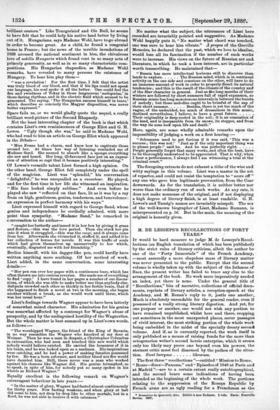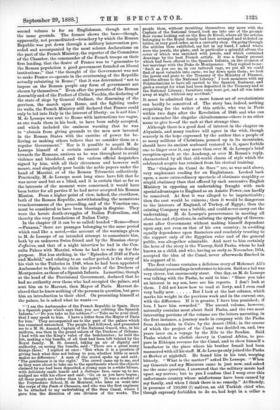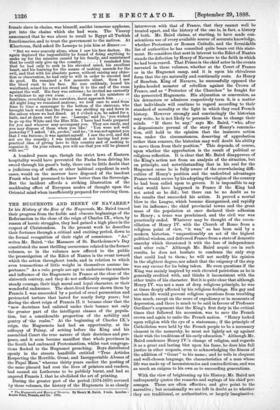M. DE LESSEPS'S RECOLLECTIONS OF FORTY YEARS.* IT would be
hard measure to judge M. de Lesseps's Recol- lections (an English translation of which has been published) by the strict rules of literary criticism, albeit the author be one of the " Forty Immortals " of the French Academy, —most assuredly a more shapeless mass of literary matter was never presented to the public. Except that the second volume is wholly taken up with the subject of the Isthmus of Suez, the present writer has failed to trace any clue to the arrangement of the book. No work more imperatively needed an index, yet there is none. Under the general title of " Recollections," bits of narrative, collections of official docu- ments, reprints of literary articles, a reception-speech at the Academy, and M. Renan's reply to it, jostle one another. Much is absolutely unreadable for the general reader, even if possessed of a really strong literary digestion. And yet, for one purpose or another, one would not wish any portion to have remained unpublished, whilst here and there, cropping out sometimes in the most unexpected places, occur passages of vivid interest, the most striking portion of the whole work being embedded in the midst of the specially dreary second volume. And if, as is currently reported, the work itself is only published as a means of raising funds for the more than octogenarian writer's second heroic enterprise, which it seems only too likely may prove one beyond even his powers, the sternest critic must feel disarmed by the pathos of the situa- tion. Sant lacrymw librorum.
The first three " recollections "—entitled " Mission to Rome, " Rome—Suez—Panama," and " Episodes of 1848 at Paris and at Madrid "—are to a certain extent really autobiographical, and the second bears some indications of having been_ intended as the beginning of the whole work. The portions relating to the suppression of the Roman Republic by French arms are as ugly reading for a Frenchman as the • Souvenirs de Quarante dna. Difdles a nies Enfants. 2 vols. Paris: Nouvelle Revue. 1887. "'I am the Ambassador of the French Republic in Spain. Here is a Spanish paper which says that you are robbing the Spanish Infanta.'—' Do you take us for robbers ?'—' Take me to your chief, that I may speak to him. I have a letter from the Mayor of Paris for him.' They accompanied me to the part of the palace which has remained untouched. The people had followed, and presented me to a M. St. Arnaud, Captain of the National Guard, who, in his uniform, was then in the grand saloon of the Duchess of Orleans. I had with me the King's valet of the bedchamber; he held the list, making a big bundle, of all that had been left behind by the Royal family. M. St. Arnaud, taking an air of dignity and authority, on seeing the bundle, said : There are a great many things there.' I replied at once : But when it is a question of giving back what does not belong to you, whether little or much makes no difference.' A man of the crowd spoke up and said : The gentleman is in the right.' The crowd came up to me, and as they were about to take me to the apartments where the objects claimed by me had been deposited, a young man in a white blouse, with delicately made hands and a distingtd face, came up to me, nudged me with his elbow and said : 'Go on as you have began ; all these people are better than is thought.' It was a student of the Polytechnic School, M. de Montaut, who later on went into the corps of the Posts et Choussees, and who was the first engineer to be attached to my undertaking of the Suez Canal, where I gave him the direction of one division of the works. The second volume is for an Englishman, though not on the same grounds. The former shows the base—though, apparently, not premeditated—treachery by which the Roman Republic was put down through a military intervention pre- ceded and accompanied by the most solemn declarations on the part of the French Ministry, the reporter of the Committee of the Chamber, the commander of the French troops on their first landing, that the desire of France was to "guarantee to the Roman population a good government founded on liberal institutions;" that "the thought of the Government was not to make France co-operate in the overturning of the Republic actually subsisting in Rome ;" that it was determined " not to impose on the Roman people any form of government not -chosen by themselves." Even after the protests of the Roman Assembly and of the Prefect of Civita Vecchia, the declaring of the state of siege by General Oudinot, the disarming of the garrison, the march upon Rome, and the fighting under its walls, the French Ministry still declared that France could only be led into Italy in the interest of liberty: on is sait Bien ! M. de Lesseps was sent to Rome with instructions too vague, as one reads them in his book, to have been safely accepted, and which included the ominous warning that he was to "abstain from giving grounds to the men now invested in the Roman States with the exercise of power for be- lieving or making others believe that we consider them as a regular Government." Nor is it possible to acquit M. de Lesseps himself of a certain amount of double-dealing towards the Romans, anxious as he was throughout to avoid violence and bloodshed, and the various official despatches signed by him, with all their cleverness and however well meant, read singularly poor beside the noble papers under the hand of Mazzini, or of the Roman Triumvirs collectively. Practically, M. de Lesseps must long since have felt that he was never used but as a blind, and it is certain that so far as the interests of the moment were concerned, it would have been better for all parties if he had never accepted his Roman Mission. From a higher point of view, indeed, the overthrow, both of the Roman Republic, notwithstanding the monstrous treacherousness of the proceeding, and of the Venetian one, must be considered to have been blessings in disguise. They were the heroic death-struggles of Italian Federalism, and thereby the very foundations of Italian Unity.
In the chapter (if it can be so called) headed " Rome—Suez —Mumma," there are passages belonging to the same period which read like a novel,—the account of the warnings given to M. de Lesseps of an intended attempt to assassinate him, both by an unknown Swiss friend and by the Russian chargti d'affaires, and that of a night interview he had in the Con- sults Palace with Mazzini, whom he had to wake up for the purpose. Not less striking, in the " Episodes of 1848 at Paris and Madrid," and relating to an earlier period, is the story of his visit to the Tuileries in 1848, when he had been appointed Ambassador to Spain, to claim the jewels of the Duchess of Montpensier, as those of a Spanish Infanta. Lamartine, though at the head of the Provisional Government, declared that he had no authority over those who had occupied the palace, and sent him on to Marrast, then Mayor of Paris. Marrast de- clared that he knew nothing of the persons in question, but gave him an introduction to their chief. On presenting himself at the palace, he is asked what he wants :— people then, without troubling themselves any more with the Captain of the National Guard, took me into one of the ground- floor rooms looking out on the Rue de Rivoli, where all the articles belonging to the Royal family had been arranged and ticketed on tables, in very good order, as in a curiosity shop. On going through the articles thus exhibited, my list in my hand, I asked where were the jewels, the plate, and in particular a splendid album the cover of which was enriched with jewels, and which contained drawings by the best French artists. It was a family present which had been offered to the Spanish Infanta, on the occasion of her marriage with the Duke de Montpensier. They replied to me : Such as you see us, in our tattered rags, we put all we could find of most valuable into carts ; we lay down upon them ; we took the jewels and plate to the Treasury of the Ministry of Finance, and the album to the National Library.' I took measures with my Polytechnician to have all carried to the Spanish Embassy, and gave a receipt for what had been deposited in the Treasury and at the National Library; furniture vans were got, and all was taken away at night, without any accident."
It must be admitted that a more honest set of revolutionists can hardly be conceived of. The story has, indeed, nothing surprising for the writer of this article, who was in Paris within two days after the Revolution of 1848, and who can well remember the singular chivalrousness—there is no other
name to give it—of the mob at that strange time.
Although there is a good deal of interest in the chapter on Abyssinia., and many readers will agree in the wish, though scarcely in the hope expressed by the author that a people of so many millions of Christians, penned up in its mountains, should have its ancient seaboard restored to it, space forbids one to linger over it, any more than over M. de Leaseps's brief reception-speech at the Academy, or over M Renan's reply, characterised by all that old-world charm of style which the celebrated sceptic has retained from his clerical training.
The " Origins du Canal de- Suez " are, as was said above, very unpleasant reading for an Englishman. Looked back upon, a more extraordinary spectacle of obstinate stupidity or stupid obstinacy than that offered by each successive English Ministry in opposing an undertaking fraught with such special advantages to England as an Asiatic Power, can hardly be conceived. At first it was alleged to be impracticable ; then the cost would be ruinous; then it would be dangerous to the interests of England, of Turkey, of Egypt; then the
existing Company was a bubble, and could never carry out the undertaking. M. de Lesseps's perseverance in meeting all obstacles and objections, in enlisting the sympathy of Govern.
meat after Government without making himself dependent upon any, not even on that of his own country; in avoiding equally dependence upon financiers and resolutely trusting to the support only of the Egyptian ruler and of the general public, was altogether admirable. And next to him certainly the hero of the story is the Viceroy, Said Pasha, whom he had known as a child, and who, having as early as November, 1854, accepted the idea of the Canal, never afterwards flinched in his support of it.
The first volume contains a delicious story of Mehemet Ali's educational proceedings inreference to his son. Said as a lad was very clever, but enormously stout. One day, as M. de Lesseps was talking with the Pasha, he said to him : " Since you take an interest in my son, here are his reports. I don't look at them. I did not know how to read at forty, and I even read very badly now Bat I look at the last column, which marks his weight in the previous week and in the current one, with the difference. If it is greater, I have him punished; if less, I have him rewarded." The second volume, however, naturally contains most about Said Pasha, and the two most interesting portions of the volume are the letters narrating, in the first instance, a journey made in company with the Pasha from Alexandria to Cairo by the desert (1854), in the course of which the project of the Canal was decided on, and, two years later on, a voyage by the Nile to the Soudan. Said Pasha wished to abolish slavery in Central Africa, to pre- pare in Ethiopia revenue for the Canal, and to show himself a benefactor in the place where his brother Ismail had been massacred with all his staff. M. de Lesseps only joined the Pasha at Berber at nightfall. He found him in his tent, weeping bitterly. "What is the matter Is'" asked De Lesseps. " When my Generals and my Ministers came in just now, and asked me the same question, I answered that the military music had upset my nerves; but to you I confess that I weep over this unfortunate country whose misfortunes have been caused by my family, and when I think there is no remedy." At Shendy, in presence of 150,000 (P) natives, an old Turkish chief who, though expressly forbidden to do so, had kept in a cellar a female slave in chains, was himself, amidst immense applause, put into the chains which she had worn. The Viceroy announced that he was about to recall to Egypt all Turkish functionaries, and to trust the government to the natives. At Khartoum, Said asked De Lesseps to join him at dinner :—
" But we were scarcely alone, when I saw his face darken. He again deplored the impossibility he found of doing anything to
make up for the miseries caused by his family, and maintained that he could only give up the country I reminded him that he had only to seek in his elevated mind, his excellent heart, and his learning for the means of making amends for the evil, and that with his absolute power, without raising any objec- tion or observation, he had only to will in order to succeed and do good. He remained a few moments silent. Soon I saw the blood rush to his face. He rose suddenly, loosed his waistband, seized his sword and flung it to the end of the room against the wall. His fury was extreme ; he invited me earnestly to withdraw to my own room None of his ministers or familiars, crouching in the corridors, durst approach him
All night long we remained anxious; we took care to send from time to time a messenger to the bottom of the staircase, who brought back word that the Prince was striding up and down in the saloon where we had dined. At 3 o'clock a.m. he asked for a bath, and at dawn sent for me. Lesseps,' said he, you wished to go np the White and the Blue Nile. I have had boats prepared for you and whoever may accompany you. They are ready, and you may dispose of them when you like.' You were not well yesterday P' I asked. Ah, pardon,' said he ; it was not against you that I was furious ; it was against myself. I saw the evil, and did not see the remedy; I was irritated at not having had your practical idea of giving laws to this country and of seeking to organise it. On your return, you will see that you will be pleased with me."
A hundred years ago, though the strict laws of Eastern hospitality would have prevented the Pasha from driving his sword through his guest's body, there can be little doubt that a judicious cup of coffee, or other habitual expedient in such cases, would on the morrow have disposed of the insolent Frank who had presumed to know better than the Sovereign. But the incident affords a striking illustration of the maddening effect of European modes of thought upon the Oriental mind when insufficiently prepared for receiving them.








































 Previous page
Previous page